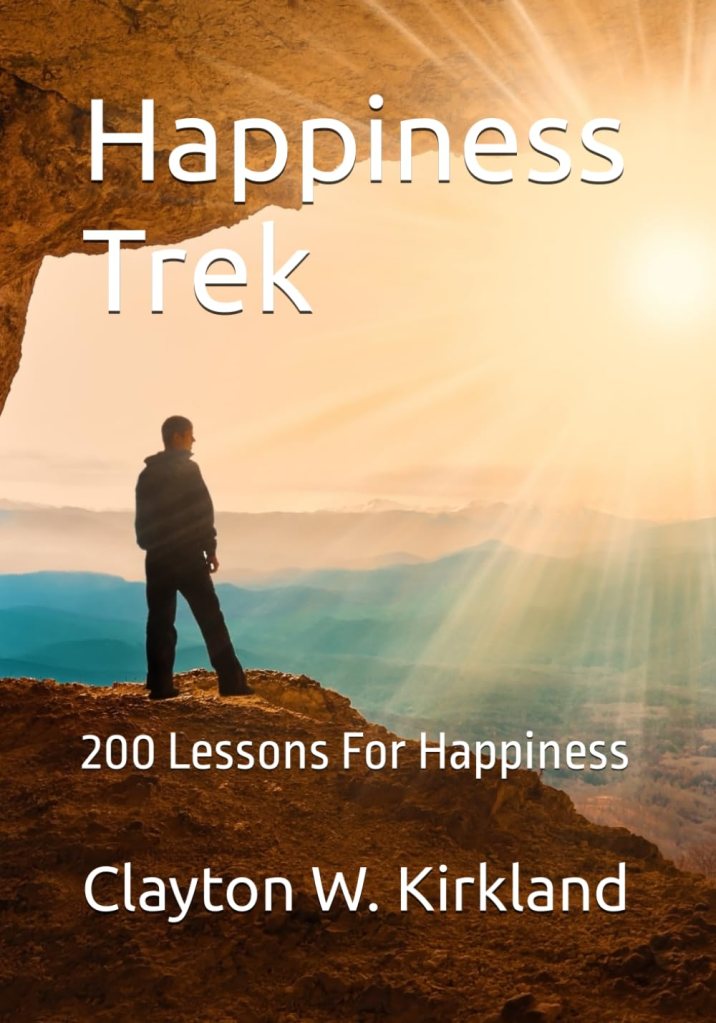
Happiness Trek
Clayton W. Kirkland
Independently Published (2024)
ISBN: 979-8874450236
Reviewed by Dawn Colclasure by Reader Views (05/2024)
What does it take to be happy? I mean, REALLY happy? If you’ve ever pondered this question, then “Happiness Trek: 200 Lessons for Happiness” by Clayton W. Kirkland is the book for you. This book is a very basic and fast read. What I like is how the author puts forward certain ideas to back up each rule, without going into too much detail about it. That would certainly exhaust this reader! And while there are no quotes from professionals or clients to back up the author’s claims, there are studies cited as well as historical breakthroughs to support ideas in this book.
“Happiness Trek” opens the door to allowing those who read these ideas to think about them and figure out ways to put them to use. For example, the lesson for decluttering to enrich our happiness may be a big challenge for certain individuals who struggle with mental health issues or mobility problems. However, seeing it as a tool to strengthen our happiness and improve our overall health could compel such individuals to think about this strategy. Recognizing it as an important part of our overall happiness allows readers who cannot meet such criteria to ponder how they can start looking for a solution to this barrier.
Another thing I like about how these lessons and ideas are written is how the author recognizes that they are not set in stone for everyone, because everyone is different. We all have different sleep patterns, living conditions and finances. So, in this way, the author does note that while certain lessons are important, they may not suit everyone. His tone is supportive, instructional, and conversational. There is no forceful tone at all. No marching orders. He is more suggestive rather than demanding that readers put these lessons and ideas to use.
One thing Mr. Kirkland points out is that personal happiness will not happen right away. It develops over time. The same is true for other things discussed in this book, such as personal growth. He writes on page 49:
Personal growth is a lifelong journey, and it’s crucial to be patient and compassionate with yourself during this process. It’s also essential to set realistic expectations and acknowledge that growth can occur in different areas at different rates.
In one part of the book, the author discusses some of the more negative things which can affect our happiness, such as overthinking, competitiveness and imposter syndrome. I liked how he explores both the good and bad of each of these things, because it gave me the chance to see these “bad” things in a different light.
The lessons and ideas in this book can be applied on a personal, local, and global scale. For global things, it can either inspire the reader to take action to make these things a reality or it can compel them to think about what role they can play in bringing about these changes.
The author acknowledges that there are some expectations we may cling to which can hamper our ability to be happy. One of those things is the desire to be liked by everyone. With this expectation, the author points out on page 98:
Being liked by everyone isn’t a realistic or healthy expectation.
He goes on to share why this is true. The same thing happens with other unrealistic expectations we may have, and the author discusses these in different parts of the book.
There is also a discussion in many parts of the book on what is harmful to our mental health. Good mental health is essential to our happiness, though those living with mental health issues have adapted to the conditions they live with by taking medication and seeking professional help, thereby creating a modicum of happiness for themselves in their lives. Additionally, there is the reminder of breaking bad habits, limiting our exposure to toxic forms of media, and sticking to our personal boundaries. The author understands that life situations can differ, just as people and cultures can differ, but there seems to be an emphasis on monitoring these things to maintain our happiness.
While Mr. Kirkland is understandably trying to cover everything in a person’s life, not everything in the book may be of interest to the reader. For example, some chapters discuss romantic relationships and family planning. This may not apply to someone in their golden years or even to a preteen who might be reading this book. Even so, there is still a lot of good information in this book which can be helpful to someone in need of this kind of advice.
The big thing the author stresses is how many of the things we deal with in our lives – overthinking, loneliness, rejection, and embarrassment – are all natural parts of life that can happen to anyone occasionally. Recognizing that these things are natural allows us to better cope with and get through them. At the same time, however, he does point out when natural things provoke unnatural reactions or circumstances and goes on to point out what to be aware of when certain reactions or circumstances should be tended to.
While there were many things in this book I already knew about and practice on a personal level, there were also things I did not know about. The book contains old and new ideas, so it’s a helpful resource in managing personal happiness.
“Happiness Trek” by Clayton W. Kirkland is a valuable resource to anyone struggling with achieving personal happiness in life. Filled with helpful strategies and thought-provoking insights, this book will help readers accomplish bigger steps towards personal happiness.
